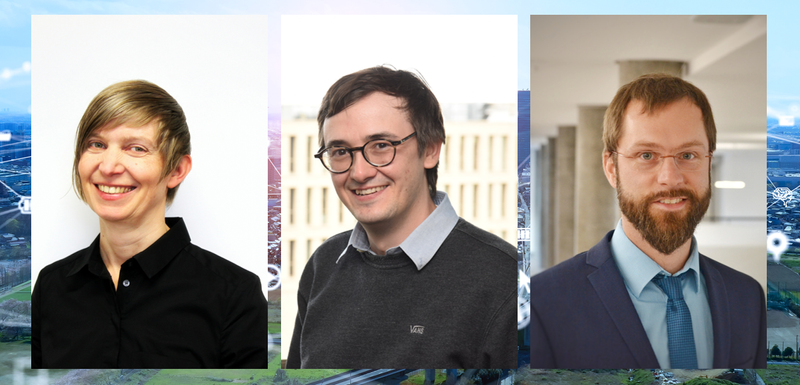emergenCITY gets new reinforcement. Professors Britta Schmalz and Jan Gugenheimer have started their work at emergenCITY and enrich emergenCITY with new research perspectives. In addition, our researcher Dr. Michael Muma will take up a professorship and continue his research as Principal Investigator at emergenCITY. (f. l. t. r.)
Prof. Dr. Britta Schmalz is an expert in the field of hydrology and physical geography and heads the department of Engineering Hydrology and Water Management at TU Darmstadt. At emergenCITY, Prof. Schmalz will develop a “Smart Flood and Low Flow Warning System” – a warning system that uses environmental monitoring to detect and warn of floods and low flows at an early stage. As a result of climate change, the risk of heavy rainfall and flooding for cities will continue to increase. At the same time, heat waves and drought will increase in many regions, leading to changes in low-water discharges. Thus, there is a great need for early detection of flood and flash flood hazards, as well as extreme low water levels. The system’s warnings will be based on real-time measurement data, which will be analyzed by data fusion from various sources using artificial intelligence. Prof. Schmalz will test the system in a selected test area.
The research of Prof. Jan Gugenheimer pursues diverse topics in the field of virtual reality. In the Department of Computer Science at TU Darmstadt, Prof. Gugenheimer leads the new Human Computer Interaction group. His emergenCITY project, titled “What-If Scenarios: In-Situ Visualization using Extended Reality”, aims to enable experts and authorities (e.g. police officers or firefighters) to visualize complex crisis and danger situations in an “in-situ” analysis using extended reality technology. The visual analysis should enable an understanding of the current situation and, in addition, a risk analysis taking into account various “what-if” scenarios. For example, this technology can be used for mass events that threaten to become critical in terms of mass movement. In addition to the usual coping strategies, this will enable better management of crowds and flows of people. The initial focus of the research project is on crowd assessment. However, emergenCITY also offers a whole range of other opportunities for collaboration.
Dr. Michael Muma is an expert in the field of signal processing. His research at the Signal Processing Group of TU Darmstadt focused on robust signal processing and statistical learning with application in biomedicine and sensor group signal processing. At emergenCITY, Dr. Muma continues his work on radar systems for crisis operations. His project “T-Knock based DOA estimation for emergency response” is about assessing and responding to emergency situations such as rescuing people from burning or collapsing buildings after an earthquake, tornado, or tsunami. In such situations, robots are to be sent ahead into the crisis area and collect information on the number, exact locations and vital signs of people at risk. Based on the information, the rescue team can devise and execute an optimal rescue strategy. Dr. Muma’s project focuses on radar systems that can be used to locate people trapped behind walls where conventional sensors, such as lidar or thermal cameras, cannot.
We warmly welcome the new emergenCITY PIs and look forward to further cooperation.



